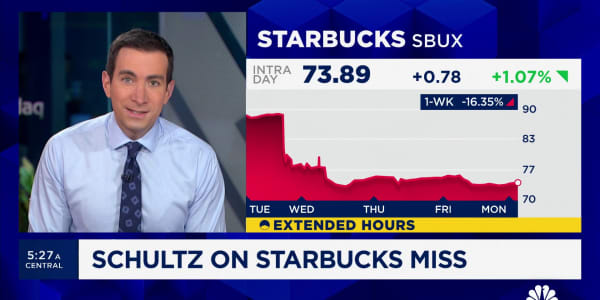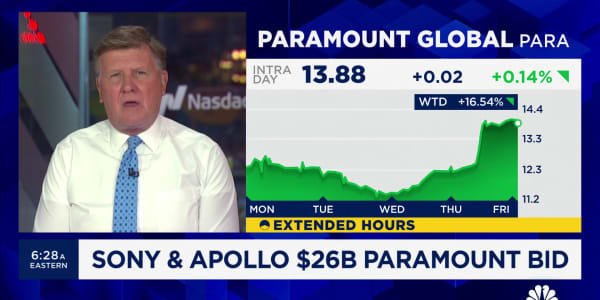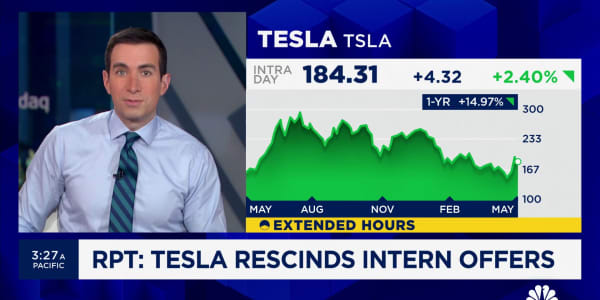Did you make this weeks' list?
It's not always easy to tell the difference between a winner and a loser. Turning down $3 billion for your company—when your company hasn't yet made a cent—might seem like the move of a loser, but it's the would-be acquirer in that case that failed to execute.
Giving up a big chunk of real estate in some of the world's busiest places might seem like a concession too great, but when it gets regulators off your back for one of the biggest mergers in history, it's probably a price worth paying.
Getting an organization so cash-strapped that it's cut back on basic services in order to bring those basic services back just for their own clients—that takes some serious market clout.
Getting Warren Buffett to buy into your company—no bigger market endorsement is possible.
But blowing earnings and laying the blame on the NSA? Now c'mon—if you're gonna lose, at least own up to it.
Here are this week's biggest winners and losers, as seen through the lens of CNBC.
Winner: Exxon Mobil
Remember back during the financial crisis when every time there was a moment of panic (and there were plenty of those) President Obama would say, "I spoke to Warren Buffett on the phone this morning ..." Yep, there's no better way to calm investors than saying Buffett has your back, but it doesn't always require a crisis. For a slow-growing company—which also happens to be among the world's biggest—that has, for some time, failed to impress investors with lack of growth in the precious commodity stockpile, it's nice to have Warren step up and buy a big chunk of shares.
Exxon Mobil received the Warren Buffet seal of approval on Thursday when Buffett's Berkshire Hathaway took a $3.7 billion stake in the oil company. Buffet jumped on the stock after prices fell to $86 lows in the second and third quarter. This buy was revealed in the same Thursday SEC filing as Berkshire's sale of ConocoPhillips shares—44 percent of its holding. Buffett had previously apologized to shareholders on his ConocoPhillips position, saying that he has no special insight into the future movements of oil prices.
"Exxon is a good flight-to-quality stock. ... The stock has also lagged the market in the last three to five years. That makes it a typical Warren Buffett holding."—Fadel Gheit, Oppenheimer oil analyst.
Winner: Apple
Apple may be stalling in consumer market share, but the company's influence in business is growing—with the same consumers that bought up iPads and Macs now wanting their employers to migrate to the tech platform on which they are most comfortable. Eighteen percent of the business market in North America now belongs to Apple, up from 3 percent a few years ago, according to Forrester data. Apple is also launching several initiatives to penetrate the market even further by releasing enterprise-applicable software for free and strengthening internal support for enterprise sales and support.
"Apple products are fundamentally built for ease, and it has a user-centric interface. It's more bad news for Dell, Microsoft and the HPs of the world."—Trip Chowdhry, analyst at Global Equities Research
"For Apple it's an aggressive move. They have cut out a nice space in the enterprise market, especially with their iPad. Enterprises are finally figuring out what the tablets can do and how they can be used."—Carolina Milanesi, Gartner analyst
Winner: US Airways/AMR
Give a little, get a little. That's what US Airways and AMR did to get the Department of Justice off their back. And now the merger that would create the largest air carrier is one step closer to proceeding. The companies agreed to divest facilities at seven different airports before merging—slots mainly at Ronald Reagan Washington National and New York LaGuardia, among others. The freed airport space allows for low-cost carriers to expand their coverage.
The combined US Air and American entity will "have a strong position against Southwest, United and Delta."—Jay Sorenson, president at IdeaWorks, an airline research firm
Winner: Amazon
The United States Postal Service is a mess, constantly begging Congress for more money and trying to figure out a way to compete in a digital era. The USPS does an amazing job just getting the mail delivered on time—heck, it is a logistics marvel—but boy are its finances a mess. Amazon to the rescue. ...
Amazon and USPS are now offering a Sunday delivery option for New York– and LA-bound packages from the online retailer. This is a rare win for the government agency that's seen seven consecutive quarters of net losses as their most profitable product—stamp mail—continues to decline in sales. USPS faces stiff competition from parcel delivery companies FedEx, DHL and UPS, but FedEx and UPS currently do not offer Sunday service. However, the organization will need more wins to stay afloat, as it currently loses $25 million daily.
"With this new service, the Postal Service is now delivering packages seven days a week in select cities. Customers can expect the same reliable and valued service that the Postal Service currently provides."—Postmaster General Patrick Donahoe
Winner: Macy's
As retailers everywhere hunker down for a weak forecasted holiday season, Macy's heads into Black Friday with confidence, as strong third-quarter revenue and profits handily beat analysts' expectations. The company launched a new ad campaign in the third quarter and regionalized stores to cater to local shoppers. Sales improved in almost every region of the country, but some analysts warn that lower margins may mean that the growth in sales may come from more markdowns and not the new local value-add strategy.
"They're in good shape. Unless something changes abruptly in consumer sentiment, they should have a great holiday season."—Brian Yarbrough, Edward Jones analyst
Loser: The big banks
Not even Warren Buffett being out there with his billions could help the too-big-to-fail banks this past week.
Moody's cut the credit ratings of Morgan Stanley, Goldman Sachs and JPMorgan this past Thursday after deciding that the federal government is less likely to bail the financial institutions out in the future due to Dodd-Frank regulations. This cut echoes the June sentiment of rival ratings agency Standard & Poor's. Moody's also cut the baseline credit ratings of BNY Mellon and State Street while raising or confirming the ratings of Bank of America, Citigroup and Wells Fargo. Morgan Stanley's downgrade takes the bank to just two notches above "junk" status.
"Over time they [credit ratings] tend to migrate within a notch of each other. ... The market will price the debt of these companies; the ratings are an important input, but they're only one input."—Glenn Schorr, bank analyst at ISI
Loser: Cisco
It's not easy being an old-guard technology company trying to reinvent itself for the mobile and cloud age, and it certainly isn't a task made any easier when you tell investors the NSA is providing one more business headache.
After a big earnings miss this week, Cisco said that the NSA's spying program may have cost the network-equipment manufacturer international revenues. Cisco officials said the from Chinese political backlash after former U.S. spy agency contractor Edward Snowden exposed the widespread NSA spying programs, the data of which is partly transmitted through Cisco equipment. Shares of Cisco's competitors also fell after the weak earnings message from Cisco.
Loser: Facebook
Facebook offered to acquire Snapchat for $3 billion in cash—triple its previous offer and a nice chunk of change for a revenue-less, profitless start-up. But not enough!
Snapchat walked away from the deal, citing a desire to wait until its valuation grows—presumably at a time it actually makes a dime. (Some reports speculated the founders did not want to work for Mark Zuckerberg, either.) Snapchat is immensely popular with teenagers and college students, clocking in at 200 million "snaps" sent per day, according to one investor. The declined offer was part of a Facebook initiative to reverse the social media platform's decreasing usage by U.S. teenagers. The company plans to hold out for an acquisition deal until at least next year, according to Evan Spiegel, Snapchat's 23-year-old co-founder and CEO.
Loser: Cash-only business owners
Cash may not be king anymore. The 55 percent of American small businesses who don't accept credit cards may be missing out on $100 billion in sales annually, or roughly $7,000 per company. The reasons why companies still stay with cash are wide and varied: Some have margins that are too low to afford a credit card fee, some aren't willing to change routine, and some are close enough to an ATM to not have to deal with cards. However, the use of card payments is growing, and with more mobile payment solutions such as Square, GoPayment and PayPal Here, merchants may soon find it too expensive not to offer a card option.
"Welcome to 1999! All of our stores (other than GCT) now take CREDIT CARDS! Our Yelp ratings about to skyrocket #sorryittookustenyears,"—Tweet by Joe Coffee, a chain of coffee shops that formerly only accepted cash
Loser: Kohl's
Unlike rival Macy's, Kohl's stumbled last quarter after sales fell 1.6 percent. Customer traffic to both online and physical stores fell in the third quarter, prompting many analysts to revise their earnings forecasts assuming continued weaknesses for the retailer. Kohls plans to put more money into ad and marketing campaigns ahead of the holiday season to attract more shoppers.
"Let's be clear: We were disappointed in the third-quarter results."—Ken Mansell, Kohl's chairman, president and CEO




